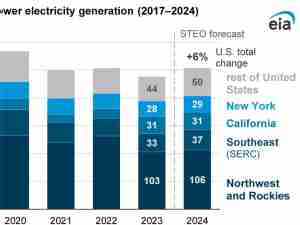Germany plans to turn its fledgling liquefied natural gas sector into a hub for supplying some of its neighbors with fuel as Europe seeks alternatives to Russian flows.
Since last year, the continent’s biggest economy has rapidly adopted LNG amid fears of gas shortages caused by Russia’s supply cuts. Now it wants to expand capacity for handling the super-chilled fuel so that it can boost exports to nations — mostly in eastern Europe — in the coming years.
Germany has already fast-tracked several LNG projects — including terminals in Wilhelmshaven and Lubmin — and plans to open more floating and land-based facilities in the months and years ahead. The government sees a need to boost capacities to ensure energy security, though critics say that massive overcapacity for transporting the fossil fuel endangers climate goals.
Berlin expects to ship about 5.5 billion cubic meters of fuel to European nations this year, rising to 6.7 billion in 2026, according to an Economy Ministry report for the budget committee. It sees demand for deliveries from the Czech Republic, Slovakia, Austria, Ukraine and Moldova.
With current infrastructure not sufficient to meet demand home and abroad, the expansion is in line with what’s needed “and necessary in terms of European solidarity,” according to the report.
By 2024, six floating storage and regasification units could allow capacity to handle at least 37 billion cubic meters per year, the report showed. The figure could reach 54 billion cubic meters once permanent land terminals in Brunsbuettel, Stade and Wilhelmshaven open by 2026-27.
That’s close to Spain’s current LNG import capacity, according to European Union data. While LNG terminals aren’t always fully used, it would help Europe live without Russian pipeline gas, a study by the Institute of Energy Economics at the University of Cologne for the government showed.
Gas trade between European countries increased last year, when those with diversified supply sources — such as LNG — sent more fuel to neighbors by pipeline, especially in eastern Europe.
The UK boosted fuel shipments to the continent to a record last summer and continued deliveries even during the heating season. Britain normally would import gas from mainland Europe in colder months as it lacks storage to cover peak heating demand. But a mild winter and strong LNG imports kept UK gas prices mostly below those in the EU, encouraging exports.
Climate groups criticized Germany’s LNG expansion plan.
“The federal government is planning with unnecessary overcapacities and is negligent in dealing with the climate targets,” said Constantin Zerger at Environmental Action Germany.









